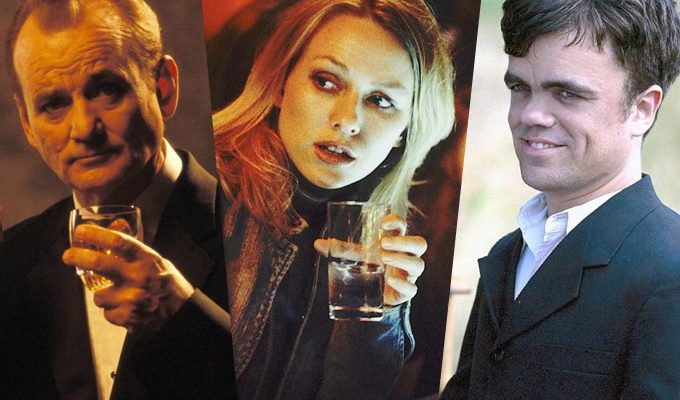 7. “Lost in Translation”
7. “Lost in Translation”
Set literally and expressively during the hazy hours before dawn, Sofia Coppola‘s wistful, low-lit contemplation of cultural and emotional dislocation is a dreamy evocation of longing. Featuring lost, somnambulant characters (Scarlett Johansson and Bill Murray) suffering from insomnia, crumbling relationships and foreign alienation, the beautiful ambiguousness of their softly-charged connection simmers with forbidden sexual potential, yet is artfully offset by the romantic backdrop of Tokyo and the protective fuzziness of a father-daughter give and take. The lonely and forlorn atmosphere is gorgeously realized by Lance Acord’s dimly-lensed cinematography, plus the coup de maître — a reflective and drone-blurry score from the (then) long dormant Kevin Shields of My Bloody Valentine. Swaying with a slow-motion cadence, even the ending of the movie, where the audience is kept at bay from an unheard secret whisper, reaffirms the idea that connections in life, even the most briefly incandescent ones, can be sadly fleeting.
 6.”The Station Agent”
6.”The Station Agent”
The directorial debut by longtime character actor Thomas McCarthy is a genuinely sweet and charming sleeper indie without the quirks and knowing hipness that generally pervade the genre. The film, also written by McCarthy, is a quietly unassuming story about the friendship that grows between a lonely dwarf (Peter Dinklage), an overly-chatty food vendor (a hilarious Bobby Cannavale) and a mysterious woman (Patricia Clarkson) in rural New Jersey. McCarthy’s patient script doesn’t force its hand, allowing these characters to organically grow closer, and in time, learn the secrets that have brought them to this place, and the fragile strands that hold them together.
 5. “Irreversible”
5. “Irreversible”
Tilted just south of madness, French provocateur Gaspar Noé keeps you on the edge in “Irreversible,” sparsely rolling out details of the beginning as we watch the horrible aftereffects in a narrative told backwards. Chronologically, we come face to face with the emotional and personal devastation of a trio of friends and lovers before we learn the depths of their own humanity. Dismissed as a sardonic, sick joke by Noe’s detractors, the film’s notorious reputation ignores the human warmth and devastating romantic power of its final breathtaking moments, particularly a closing half hour of swooning, intoxicating seduction between Vincent Cassel and Monica Bellucci, both rarely as good as they are here.
 4. “Elephant”
4. “Elephant”
Just as Gus Van Sant‘s “Last Days” skews facts surrounding Kurt Cobain‘s demise, favoring a more impressionistic portrait of its suicidal rock star, “Elephant” is less a recreation of the Columbine shootings than an echo of the tragedy, a symbol of the ripple effect in which one act of violence leads to another. Teens roam the halls of their pristine high school as if lost in a maze as Van Sant’s camera unearths the eeriness of traversing the school grounds, evoking Béla Tarr‘s trademark tracking shots, a filmmaker Van Sant also paid homage with “Gerry.” And the hypnotic, visual poetry finds the director walking a fine line between identifying with the eventual assailants and stressing that their behavior is not only reprehensible, but ultimately without explanation. He presents innumerable motives — bullying, saturation of media violence, depression — but grounds his commentary in a universal sense of unknowing. What could invoke such hostility? Van Sant’s answer to this complex question is painfully, but appropriately, inconclusive.

